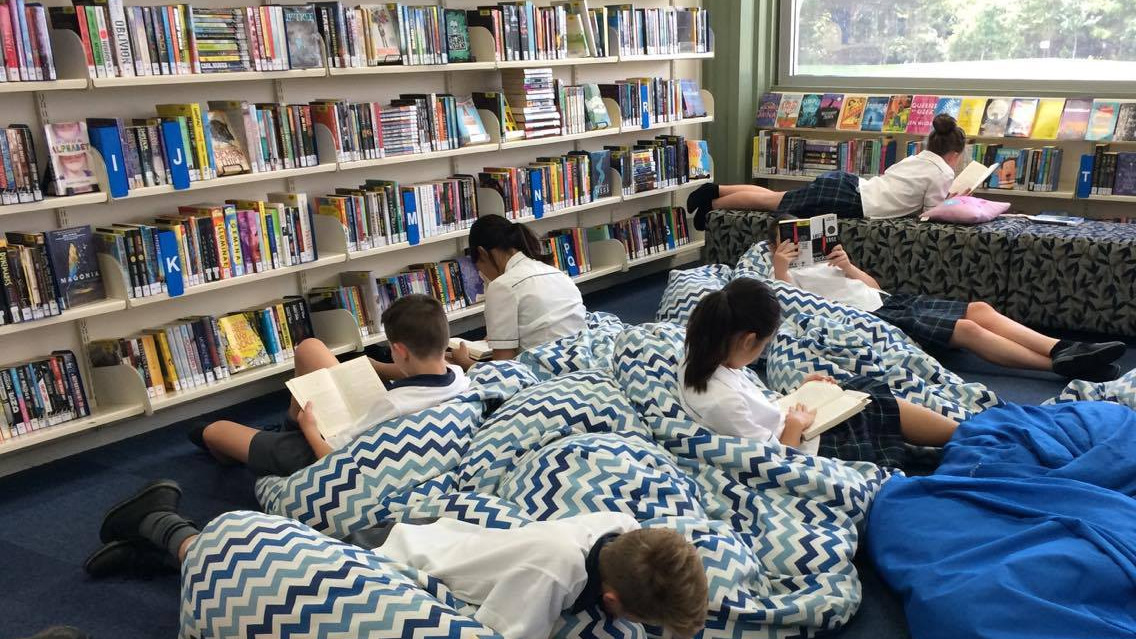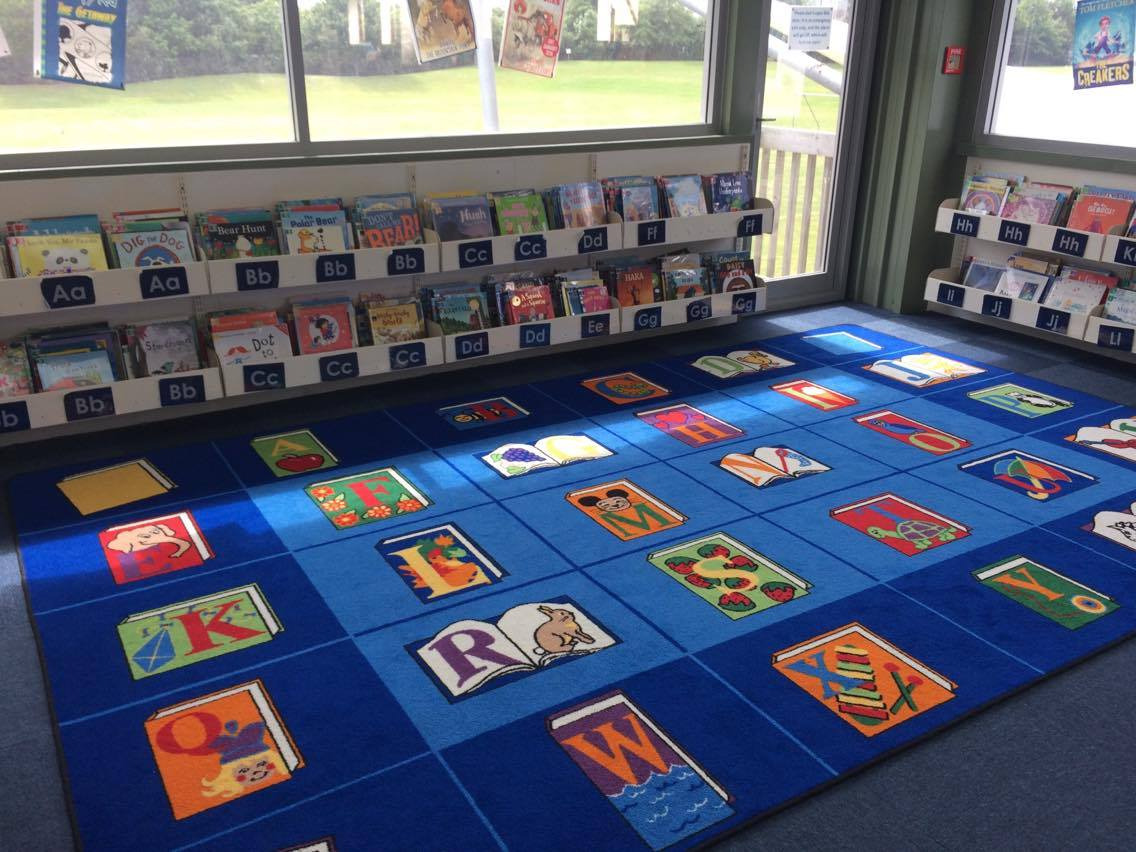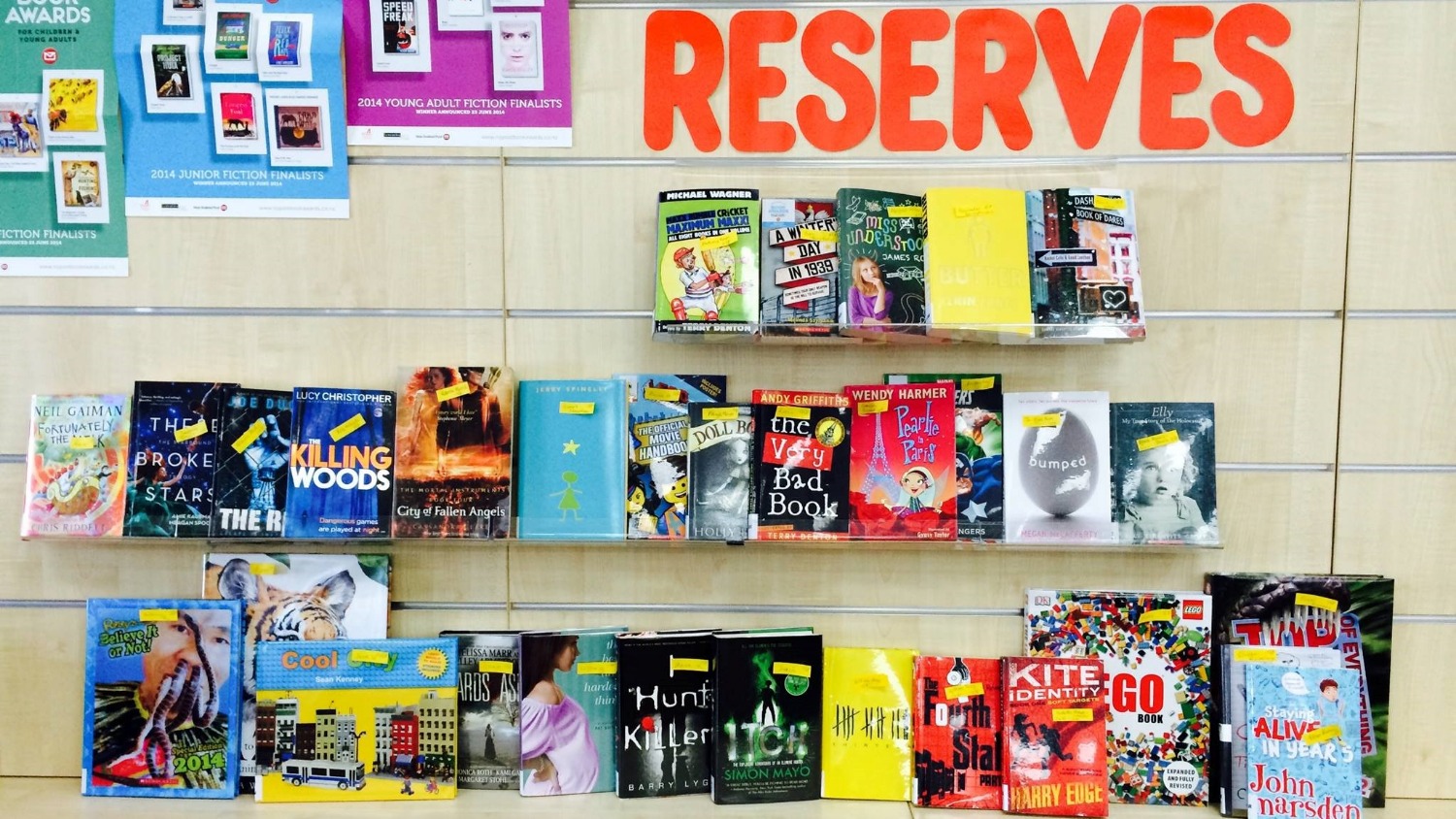Two-time judge of the Book Awards for Children and Young Adults, Fiona Mackie is an excellent person to have in charge of reforming your library. This is very lucky for Pinehurst School, where Mackie has worked for the past three years. She tells us about her role as Teacher-Librarian at this urban private school.

I’m currently the Teacher-Librarian at Pinehurst School on Auckland’s North Shore. It’s an independent, co-ed school for 870 Y0-13 students that provides the Cambridge curriculum at all levels. Our school’s roll has increased rapidly over the last three years, significantly broadening the demographics of the school.
The school is relatively new – only 26 years old – and my predecessor was there for 23 years as the librarian. When I started there, the library was a space the size of 1.5 classrooms, empty every lunchtime, had a collection of only 7000 items dominated by non-student centred material more than 15 years old, and had many rules that all began with ‘No’.
Challenges and successes
I’ve been employed specifically for rejuvenation, re-engagement and revitalisation, which I love, and it has been (and continues to be) a big challenge. As I believe much of a library’s success is down to its relationship with students and staff, my priority was to make connections and find out what everyone wanted from the library. I created surveys as well as talking to everyone I could, asking for their feedback on how we could improve all areas of the library and services provided.
The responses came quickly – they wanted lots of new books! All different genres, styles and authors. Challenging material that made them think! Picture books that excited them. Interesting non-fiction books! Furniture that catered for them. To be be welcomed and accepted! Fortunately our Principal and Bursar supported me, finding extra money so we could start the rejuvenation process, and I continue to receive that level of support now. After thoroughly evaluating the collections, the list of gaps was quite long, and so there were many, many priorities that we continue to chip away at.
‘…they wanted lots of new books! All different genres, styles and authors. Challenging material that made them think! Picture books that excited them. Interesting non-fiction books!
Seating and setting
Another important facet of revitalising the library was looking at the layout and how user-friendly it was, how collections were arranged, and how the different ages and stages were catered for. The picture books were moved into face-out bins, and the newly independent readers were pulled together to create a face-out ‘Superstars’ collection. All the sophisticated picture books, graphic novels, puzzle and maze books, and highly illustrated non-fiction were grouped together as Visual Texts. These collections work very hard and are really popular.
We also purchased bean bags and cushions, as there wasn’t enough seating for our senior students, which was greatly appreciated by them. We weeded lots and lots and lots and lots of outdated material, and began buying new material to fill the many gaps identified.

We also started removing the barriers that ‘No’ had put in place, upping the loan amounts hugely, allowing books to be reserved, requesting that the primary students be allowed into the library at lunchtime, providing a ‘Suggestions for Purchases’ book and acting on those suggestions, providing games and puzzles – and I began learning everyone’s names and needs, likes and dislikes. Everyone responded very positively to this, and the feedback via surveys supported the changes. The challenges continue – providing more material for our avid readers, establishing an e-audio book collection, sourcing material in other languages and for learner support, supporting research and inquiry effectively, squeezing in more classes for our growing roll, but the next big project is the expansion of the library and I CAN’T wait for that!
Thirty-five classes a week!
I’m very lucky as I work with a librarian every day, which means we can support each other as I work with the 35 classes we have booked in weekly. Being the teacher in the library means I see all Y0-8 classes every week and the Y9-13 English classes alternate weeks, as we just don’t have space for multiple classes at the same time. This involves switching gears rapidly – moving from motivating two classes of Y7s with their reading challenges, to enthusing Y4s, to engaging Y10s, to delighting Y1s with The book with no pictures, to talking with Y9s about genre, to checking in with Y8s with their reading challenges: add in 50 – 60 people at lunchtime and that’s a Friday for us!
The best part of being in the library full time is getting to know all the students and staff, as everyone comes to the library for text and library books, and I pride myself on knowing the names of everyone across the school. I also support classes with inquiry and research, and this will involve quite a bit of timetable juggling for me in 2018, as we’ll have 38 classes every week – phew!
Much of my work with classes involves promoting books with enthusiasm and energy, creating and developing readers, and helping those who hate reading, hate it a little bit less. I especially look out for those doing the ‘I don’t know what to read walk’ – the aimless drifting around, the pick up/put down of books, the staring at shelves and I do my best to help them find the right thing for them. As a result, the students now talk about the ‘I don’t know what to read walk’ when asking for help.
Much of my work with classes involves promoting books with enthusiasm and energy, creating and developing readers, and helping those who hate reading, hate it a little bit less.
And I have been known to toss books across the library to students, grab them as they walk in and thrust books at them, telling them that when I was shopping, I thought of them, because I did! The personalisation of purchasing has been incredibly successful and makes them feel recognised and understood. Our staff are looked after too, as at the end of each term we run a ‘Happy holiday reading’ session for all staff, with lovely food and drinks, and lot of wonderful books for them to borrow. We know what they like, and purchase material to match those interests, as well as contributing to collegial relations across a very wide group of people
School Library Association
One thing I value is being a member of SLANZA. I joined the Auckland School Library Association (ASLA) when I was working at the National Library, and was on that committee when SLANZA was being formed, and the International Association of School Libraries conference was held in Auckland. It was an amazing experience, presenting at the conference to such a wide range of people involved in school libraries from New Zealand and around the world.
I was on the SLANZA Auckland committee for ten years, including being on the SLANZA conference committee twice, and I had the privilege of being SLANZA President from 2011-2013. The SLANZA Executive (past and present) does an amazing job of supporting its members and advocating for school libraries, and I cannot praise them highly enough.

My reading this year
I’ve been looking at my GoodReads, trying to decide which is my favourite book of 2017 – a bit like choosing a favourite child, I think! I’ve read some amazing graphic novels this year – Real friends, the March trilogy, Mansfield and me, All’s faire in middle school, Thornhill – and some wonderful picture books and narrative non-fiction too – Du iz tak?, My two blankets, You are stardust, How much does a ladybird weigh?, That is not a hippopotamus!
Non-fiction is the area that is the greatest concern for me when creating readers, as the range of material that is available in New Zealand has lessened significantly with publishers combining or moving offshore. There’s a constant tension between supporting our local bookshops and suppliers, or getting material from overseas via the huge online vendors, and stretching the budget as far as possible.
There are five novels published in 2017 that will always stay with me – Bastion Point: 570 days on Takaparawha, The Power, Words in deep blue, The Collapsing Empire and Nevermoor: The trials of Morrigan Crow, but on reflection, I think my book for 2017 is A Child of Books by Oliver Jeffers. Everyone I’ve read it to has been entranced, and with each re-reading, I see more and more. It is worth splurging to buy it in hardcover just for the end papers alone …

Fiona Mackie
An avid reader and book lover, Fiona was honoured to have been selected as the convenor of judges for the 2016 New Zealand Book Awards for Children and Young Adults, after being one of the judges for the 2015 awards. Qualified as both a teacher and a librarian, Fiona has taught in a range of schools across Auckland and is currently Teacher-Librarian at Pinehurst School in Albany. She worked at National Library from 1996-2009 as a reference librarian, as the national Social Sciences Selector, and as the Advisor for New Schools, working with Establishment Boards to design, build and establish libraries in new schools across Auckland and Waikato, and was also the Frances Compton Library Manager at St Cuthbert’s College from 2009-2013. Fiona was also the President of the School Library Association of New Zealand Aotearoa Te Puna Whare Matauranga a Kura 2011-13, having been involved with SLANZA regionally since its inception.



